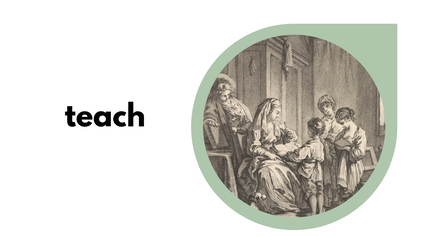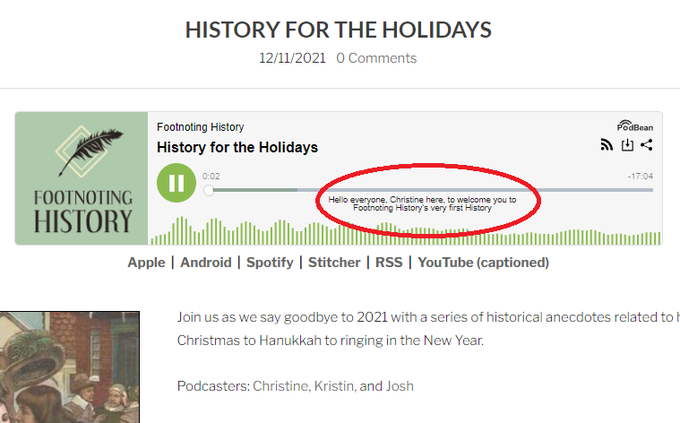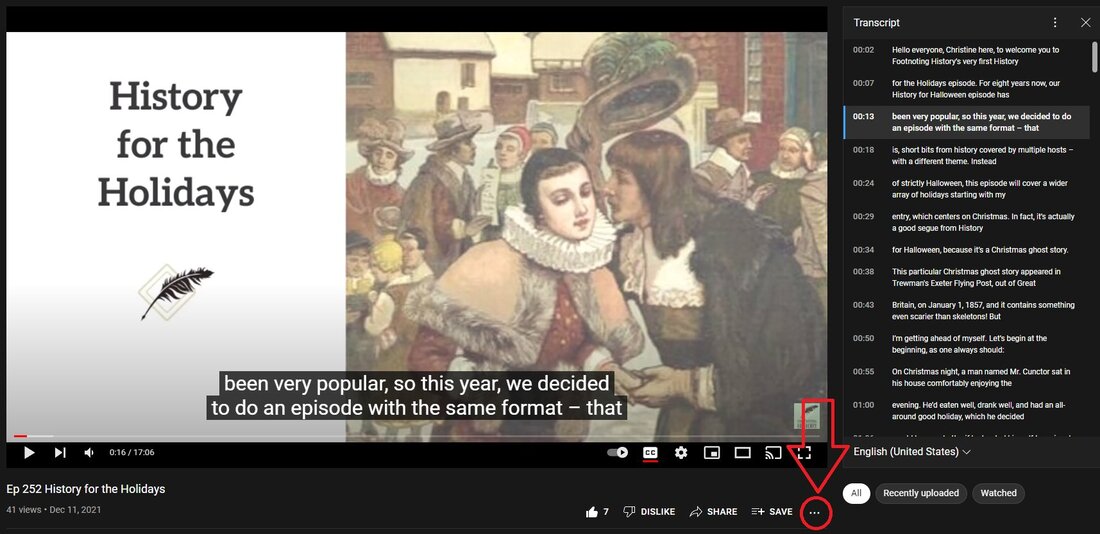welcome, educators
We are so happy that you are considering using podcasts with your students. It is our belief that podcasts are a wonderful tool for education, and we hope that by the time you are through exploring this page, you agree.
Here you will find why we think podcasts are useful in the classroom, two things to consider when choosing the perfect podcast episode to integrate into your lessons, our searchable spreadsheet to help you find episodes that suit your needs, and some sample assignments to give you ideas for integrating podcasts in your lessons.
Our goal is to update this page every June and December, to incorporate the episodes from the prior six months into the sortable chart. We are also always available via our Contact page for any questions you might have regarding our episodes and their use in an educational setting.
If you already use podcasts in your teaching, and/or are simply interested in seeing our spreadsheet of episodes sorted by time period, geographic location, and key words, please click here to visit it. More about the spreadsheet will be discussed below.
The most important thing we must stress, however obvious it may seem, is that all educators should listen to the episodes they are considering assigning before doing so. You know your students better than anyone else, and your judgment regarding what is appropriate for them will ultimately be your best guiding force.
Happy teaching!
Here you will find why we think podcasts are useful in the classroom, two things to consider when choosing the perfect podcast episode to integrate into your lessons, our searchable spreadsheet to help you find episodes that suit your needs, and some sample assignments to give you ideas for integrating podcasts in your lessons.
Our goal is to update this page every June and December, to incorporate the episodes from the prior six months into the sortable chart. We are also always available via our Contact page for any questions you might have regarding our episodes and their use in an educational setting.
If you already use podcasts in your teaching, and/or are simply interested in seeing our spreadsheet of episodes sorted by time period, geographic location, and key words, please click here to visit it. More about the spreadsheet will be discussed below.
The most important thing we must stress, however obvious it may seem, is that all educators should listen to the episodes they are considering assigning before doing so. You know your students better than anyone else, and your judgment regarding what is appropriate for them will ultimately be your best guiding force.
Happy teaching!
why podcasts?
Podcasts are a valuable resource for educators. They allow you to bring experts in a field directly into your lessons to help expand upon (or even introduce) topics pertinent to your class. You get all the benefits of having a guest speaker, without having to pay for them to visit. Plus, the no-cost nature of podcasts helps make them accessible to a wide variety of socio-economic levels, as they are readily available to anyone with an internet connection and access to a computer or smartphone, whether it be on a personal or public device. Podcasts can be used both in the classroom with the educator present or as assignments for after school. In either case, they are a rich format for stimulating discussion, teaching active listening, and helping to improve a student's ability to take notes. They are something which can truly bring educators and students together as both engage with the same content and use them to build upon traditional methods of learning.
two things to consider
- Host(s)
Not all hosts are created equal. The podcast world is one where anyone can begin a show. This can be a good thing, but it also can make it difficult to determine which podcasts are researched rigorously enough to be used in an academic setting. Many podcasts will provide biographies of their hosts on their websites. Seeking this information out before assigning an episode will help you, as the educator, determine who you see fit to be a co-teacher with you on this topic. - Sources
Perhaps the most important aspect of history podcasting is transparency regarding sources. On Footnoting History, we provide a list for each episode titled Further Reading that shows what sources we have used for our research on that topic. Many podcasts do some variation of this, either in their episodes themselves or in the show’s notes on their website. Just as we said not all hosts are created equal, neither are all sources, and it is always a good idea to investigate what the host was reading when they put their episode together.
For more about identifying a quality history podcast, click here to read Christine's blog post about the topic.
our episodes
Footnoting History has over 300 episodes, which can make deciding which ones to use seem overwhelming. To make it easier for you, we have compiled a searchable database where you can see all of our episodes sorted by geographic region and time period (for ex. medieval world, modern world, US up to 1865, etc.), with extensive keywords to help identify where an episode might fit in your lesson plans. Click here to access our searchable episode database.
Further, over time we have created some thematic series. These include women's history, Black history, Revolutionary French history, film history, and more. Click here to see our collection of curated series.
Further, over time we have created some thematic series. These include women's history, Black history, Revolutionary French history, film history, and more. Click here to see our collection of curated series.
downloadable resources
As we mentioned, good podcasts spark discussion as part of their value for education. Whether your visit to this page marks your first time incorporating podcasts into your lessons or you are just looking for something new, we are here to help. Below you will find some downloadable .pdfs to help you seamlessly add podcasts to your repertoire or perhaps shake up how you already use them.
First up, we have compiled a list of possible discussion questions for educators and students. They cover general podcasts as a means to learn about the study of history ("doing history," if you will) as well as more specific topics pertaining to certain episodes or series.
Click here to download a .pdf of our suggested classroom discussion questions.
Sometimes, creating a podcast is just as much of a learning experience as listening to one. Footnoting History host Lucy does this in her classes with undergraduates, though she believes her assignment could also be used (or adapted) for high school students. A project like this helps students develop their understanding of the topic they choose, the methods and practices utilized by historians, and how to communicate their findings with an audience in a clear and coherent manner. Click here to download a .pdf of Lucy's podcast assignment.
Finally, Elizabeth (our founder and an alumni host), once created a list of sample assignments for high school and college students using some of our episodes from 2013-2019. Click here to download a .pdf of Elizabeth's classroom assignments.
**Do you use our episodes in your lessons? If you want to see your lesson shared on this page (with credit, of course!), please don't hesitate to Contact Us. We would be thrilled to take a look and consider posting it!
First up, we have compiled a list of possible discussion questions for educators and students. They cover general podcasts as a means to learn about the study of history ("doing history," if you will) as well as more specific topics pertaining to certain episodes or series.
Click here to download a .pdf of our suggested classroom discussion questions.
Sometimes, creating a podcast is just as much of a learning experience as listening to one. Footnoting History host Lucy does this in her classes with undergraduates, though she believes her assignment could also be used (or adapted) for high school students. A project like this helps students develop their understanding of the topic they choose, the methods and practices utilized by historians, and how to communicate their findings with an audience in a clear and coherent manner. Click here to download a .pdf of Lucy's podcast assignment.
Finally, Elizabeth (our founder and an alumni host), once created a list of sample assignments for high school and college students using some of our episodes from 2013-2019. Click here to download a .pdf of Elizabeth's classroom assignments.
**Do you use our episodes in your lessons? If you want to see your lesson shared on this page (with credit, of course!), please don't hesitate to Contact Us. We would be thrilled to take a look and consider posting it!
accessibility
It is important to us to make Footnoting History accessible for as many people as possible. As such, our team has personally created accurate captions for every episode in our catalogue. You will find that the audio player on each episode’s post automatically displays captions once you hit play. Also, our YouTube channel provides the same captioning (and the font size there appears bigger than on our website’s audio player). This can be accessed either by clicking the YouTube link on the blog post for the episode you want to hear, or by visiting YouTube.com/FootnotingHistory.
If you are looking for transcripts, those are provided via YouTube. Visit the video for the episode you want a transcript of and click the three dots beneath the bottom right-hand corner of the video. The option to “open transcript” will be there. When selected, the full transcript for the episode will appear on the right-hand side of the video. You will then be able to toggle back and forth between showing the timestamps for the transcript and removing them.
If you are looking for transcripts, those are provided via YouTube. Visit the video for the episode you want a transcript of and click the three dots beneath the bottom right-hand corner of the video. The option to “open transcript” will be there. When selected, the full transcript for the episode will appear on the right-hand side of the video. You will then be able to toggle back and forth between showing the timestamps for the transcript and removing them.



